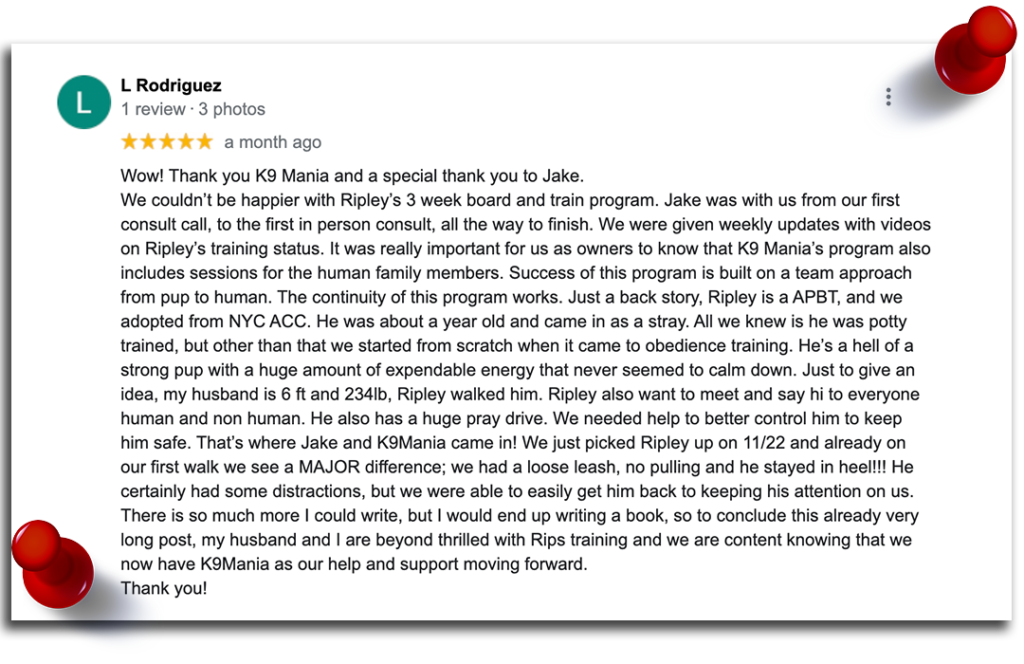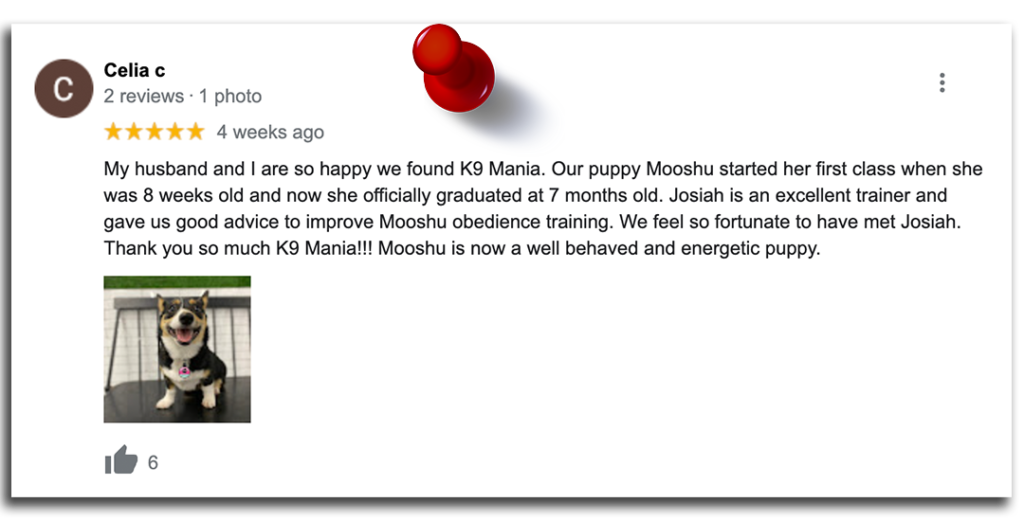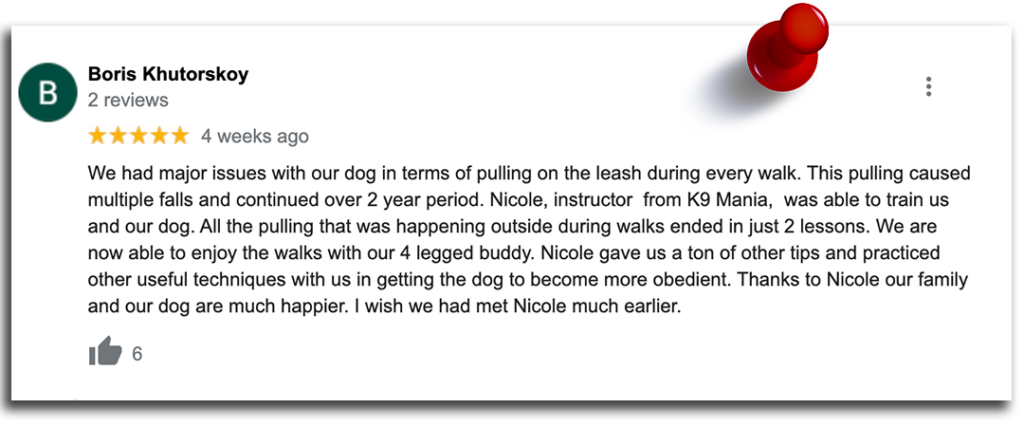Dog Trainer
Academy Programs
Our programs cater to different levels of expertise, perfect for dog trainers with different goals. No matter what you’re aiming for, we have something that can set off your dog training career in the right direction.
Are you new to training dogs? Don’t know how or where to start? Just want to test the waters and see if training dogs for a living is right for you?
Our Shadow Program makes it easier for aspiring dog trainers like you to get started in an affordable but productive way! With this short 4-week program, you’ll learn the basics of dog training and see what it’s like to work in the dog training industry.
Learning Theory
This part of the course will focus on learning the foundations of dog training such as: operant conditioning, classical conditioning, shaping, luring, and a variety of methods and techniques.
You will also learn about reinforcement schedules, reinforcement packages, timing, motivation, the 4 stages of learning, the 3 D’s of progression, blue ribbon emotions as well as the importance of home environment structure and boundaries for pet dogs.
Ground Skills
This part of the course will focus on the basic mechanics of dog training such as: leash handling, food handling/food luring, leash & prong corrections without dog, e-collar corrections without dog, defensive handling, kennel skills, door manners, verbal markers, prong collar sizing and placement, e collar sizing and placement, and timing of rewards/corrections.py training.
Obedience Training
This part of the course will focus on the basic obedience mechanics of dog training after mastery of the Ground Skills.
You’ll learn and be able to successfully apply ground skills to teach dogs the basic obedience commands: sit, down, come, place & heel (minimum obedience commands).
You’ll also be able to teach dogs with only food; only food and a leash/prong; and teach dogs with a combination of food, leash/prong, and e-collar.
This portion of the course will also require students to learn how to successfully condition the e-collar and prong collar to dogs. Additionally, supplemental commands may be required to teach dogs (such as “crate”, “let’s go”, “go potty”, “off”, “quiet”, etc.)
House & Manners skills for Pet Dogs
This part of the course will focus on teaching dogs household pet manners. You’ll learn how to troubleshoot and apply what they have learned during the Ground Skills and Obedience skills portion of the course to remove problematic behaviors and successfully teach dogs how to have proper house manners.
Want to set yourself apart from other dog trainers? Don’t just stop at basic training commands! Learn how to offer real, lasting, and even life-saving solutions to dogs with serious problems. You’ll be rewarded with a fulfilling career AND plenty of happy clients!
Go beyond the basics when you enroll in our 6-week program. We’ll teach you the fundamentals every dog trainer should know such as basic obedience and reinforcing good dog manners.
Plus, you’ll learn how to competently handle difficult dog behavior & situations that need serious help from a professional.
Learning Theory
This part of the course will focus on learning the foundations of dog training such as: operant conditioning, classical conditioning, shaping, luring, and a variety of methods and techniques.
You will also learn about reinforcement schedules, reinforcement packages, timing, motivation, the 4 stages of learning, the 3 D’s of progression, blue ribbon emotions as well as the importance of home environment structure and boundaries for pet dogs.
Ground Skills
This part of the course will focus on the basic mechanics of dog training such as: leash handling, food handling/food luring, leash & prong corrections without dog, e-collar corrections without dog, defensive handling, kennel skills, door manners, verbal markers, prong collar sizing and placement, e collar sizing and placement, and timing of rewards/corrections.py training.
Obedience Training
This part of the course will focus on the basic obedience mechanics of dog training after mastery of the Ground Skills.
You’ll learn and be able to successfully apply ground skills to teach dogs the basic obedience commands: sit, down, come, place & heel (minimum obedience commands).
You’ll also be able to teach dogs with only food; only food and a leash/prong; and teach dogs with a combination of food, leash/prong, and e-collar.
This portion of the course will also require students to learn how to successfully condition the e-collar and prong collar to dogs. Additionally, supplemental commands may be required to teach dogs (such as “crate”, “let’s go”, “go potty”, “off”, “quiet”, etc.)
House & Manners skills for Pet Dogs
This part of the course will focus on teaching dogs household pet manners. You’ll learn how to troubleshoot and apply what they have learned during the Ground Skills and Obedience skills portion of the course to remove problematic behaviors and successfully teach dogs how to have proper house manners.
Behavioral Modification & Management
This part of the course will focus on learning about dog body language, determining source causes of behavior cases, and how to troubleshoot and apply the training to solve all varying forms of: reactivity, fear, anxiety, aggression, resource guarding and other behavioral issues.
Want to know everything there is to know about training dogs? Go for the complete package and establish yourself as a Professional Dog Trainer! With this 10-week program, you’ll learn everything you need to know as a dog trainer.
Misbehaving puppy? Rehabilitating anxious and reactive dogs? Just need to teach dogs how to properly socialize?
When you can confidently help any dog with any problem, you won’t just be the first person people look to for solving their dog training problems.
You can be the last dog trainer they would ever need to reach out to!
Learning Theory
This part of the course will focus on learning the foundations of dog training such as: operant conditioning, classical conditioning, shaping, luring, and a variety of methods and techniques.
You will also learn about reinforcement schedules, reinforcement packages, timing, motivation, the 4 stages of learning, the 3 D’s of progression, blue ribbon emotions as well as the importance of home environment structure and boundaries for pet dogs.
Ground Skills
This part of the course will focus on the basic mechanics of dog training such as: leash handling, food handling/food luring, leash & prong corrections without dog, e-collar corrections without dog, defensive handling, kennel skills, door manners, verbal markers, prong collar sizing and placement, e collar sizing and placement, and timing of rewards/corrections.py training.
Obedience Training
This part of the course will focus on the basic obedience mechanics of dog training after mastery of the Ground Skills.
You’ll learn and be able to successfully apply ground skills to teach dogs the basic obedience commands: sit, down, come, place & heel (minimum obedience commands).
You’ll also be able to teach dogs with only food; only food and a leash/prong; and teach dogs with a combination of food, leash/prong, and e-collar.
This portion of the course will also require students to learn how to successfully condition the e-collar and prong collar to dogs. Additionally, supplemental commands may be required to teach dogs (such as “crate”, “let’s go”, “go potty”, “off”, “quiet”, etc.)
House & Manners skills for Pet Dogs
This part of the course will focus on teaching dogs household pet manners. You’ll learn how to troubleshoot and apply what they have learned during the Ground Skills and Obedience skills portion of the course to remove problematic behaviors and successfully teach dogs how to have proper house manners.
Behavioral Modification & Management
This part of the course will focus on learning about dog body language, determining source causes of behavior cases, and how to troubleshoot and apply the training to solve all varying forms of: reactivity, fear, anxiety, aggression, resource guarding and other behavioral issues.
Puppy Training
This part of the course will focus on students learning puppy development, socialization, potty training and puppy training.
Want more for your dog training business? Build a brand that will last a lifetime!
With our 16-week Master Dog Trainer Program, you get to learn everything you need to run a successful business in the dog training industry.
On top of intensive courses on dog training, you’ll get one-on-one coaching on the best practices in the industry such as how to have a better relationship with your clients, how to build, manage, and develop your dog training business, and more!
Already have your plate full? Don’t worry! We make sure that you get a manageable but practical workload so you can explore better opportunities in dog training while you attend to your usual responsibilities.
Learning Theory
This part of the course will focus on learning the foundations of dog training such as: operant conditioning, classical conditioning, shaping, luring, and a variety of methods and techniques.
You will also learn about reinforcement schedules, reinforcement packages, timing, motivation, the 4 stages of learning, the 3 D’s of progression, blue ribbon emotions as well as the importance of home environment structure and boundaries for pet dogs.
Ground Skills
This part of the course will focus on the basic mechanics of dog training such as: leash handling, food handling/food luring, leash & prong corrections without dog, e-collar corrections without dog, defensive handling, kennel skills, door manners, verbal markers, prong collar sizing and placement, e collar sizing and placement, and timing of rewards/corrections.py training.
Obedience Training
This part of the course will focus on the basic obedience mechanics of dog training after mastery of the Ground Skills.
You’ll learn and be able to successfully apply ground skills to teach dogs the basic obedience commands: sit, down, come, place & heel (minimum obedience commands).
You’ll also be able to teach dogs with only food; only food and a leash/prong; and teach dogs with a combination of food, leash/prong, and e-collar.
This portion of the course will also require students to learn how to successfully condition the e-collar and prong collar to dogs. Additionally, supplemental commands may be required to teach dogs (such as “crate”, “let’s go”, “go potty”, “off”, “quiet”, etc.)
House & Manners skills for Pet Dogs
This part of the course will focus on teaching dogs household pet manners. You’ll learn how to troubleshoot and apply what they have learned during the Ground Skills and Obedience skills portion of the course to remove problematic behaviors and successfully teach dogs how to have proper house manners.
Behavioral Modification & Management
This part of the course will focus on learning about dog body language, determining source causes of behavior cases, and how to troubleshoot and apply the training to solve all varying forms of: reactivity, fear, anxiety, aggression, resource guarding and other behavioral issues.
Puppy Training
This part of the course will focus on students learning puppy development, socialization, potty training and puppy training.
Client Education, Instruction, and Communication
This part of the course will focus on teaching you how to properly educate clients during: in person 1:1 private lessons, group classes, virtual lessons, midway sessions and go home sessions.
You’ll learn how to develop your own training programs, training resources to give to clients, and how to properly educate clients and client communication in regards to processes and systems of appointment confirmations, rescheduling, cancellations and follow-ups.
Sales & Client Expectations/Experience
This part of the course will focus on how to successfully conduct sales calls for inbound leads both in person and over the phone.
You’ll also learn how to properly set and manage client expectations as well as how to set the tone for the experience the client will have during the fulfillment of their dog training service.
Business Development, Growth, and Social Media
This part of the course will focus on business development and establishment (LLC, EIN, Website, Basic Bookkeeping, Business Insurance, Contracts, Business Bank Accounts, etc).
You’ll also learn more about social media content generation and business growth derived from social media presence.
CHOOSE THE BEST PROGRAM FOR YOU!
CHOOSE THE BEST PROGRAM FOR YOU!












